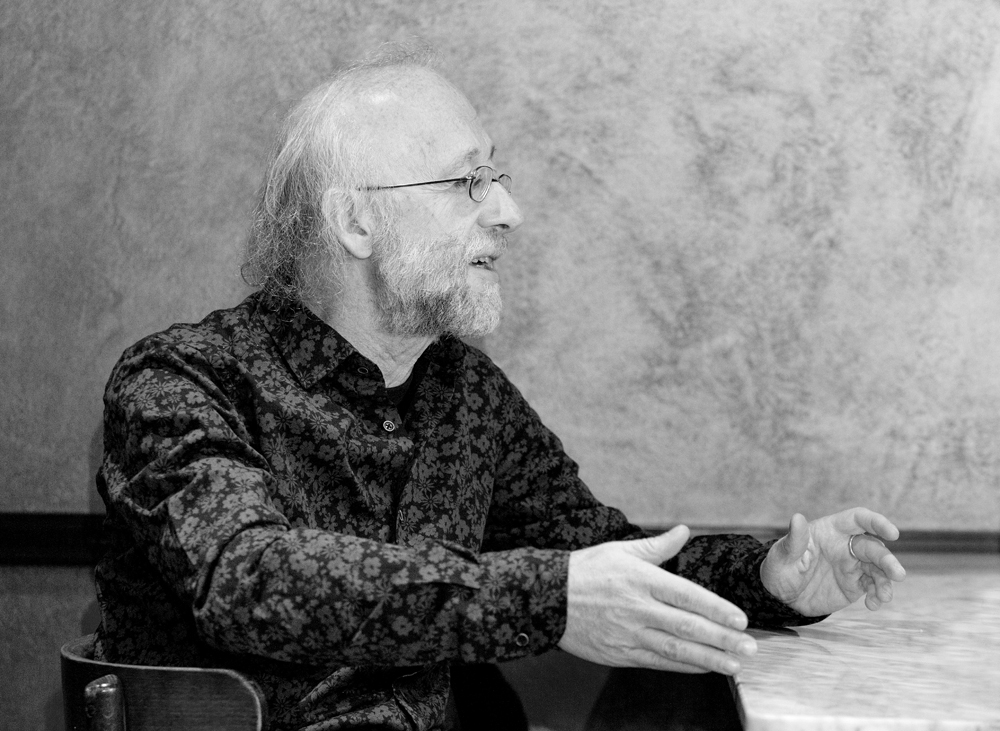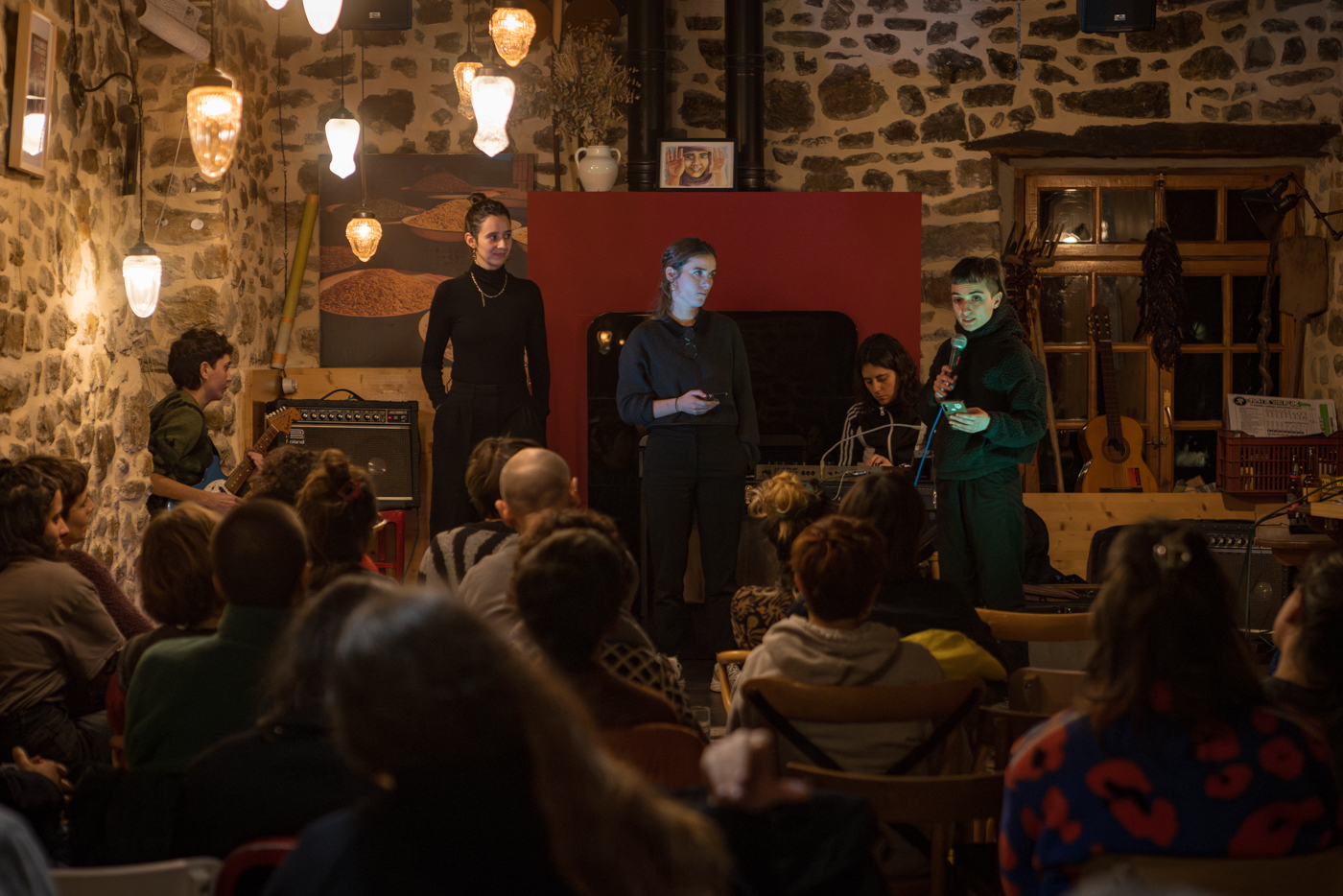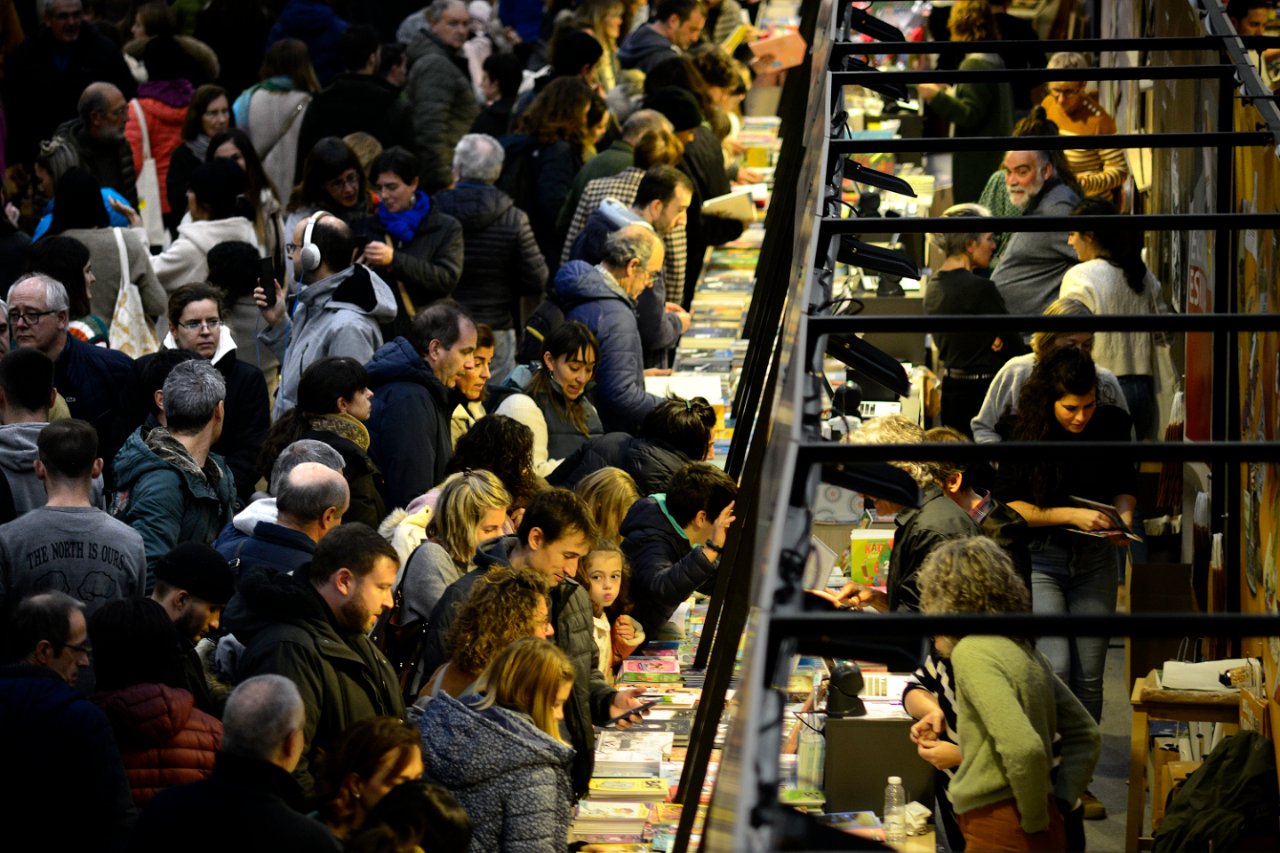"I don't trust the writers who write very different books."
- Elur Bustia’s promotional period is still long. After its publication in June last year, proposals for dialogue are still coming to Pello Lizarralde. To repeat as little as possible, we have tried to talk about what is behind the author’s literary wager with the excuse of the novel.

February is the month of St. George. With the arrival of twilight, people have slowed down the passage through the soaked streets of the Old Donostia Party. From that moment on, it is perceived that the water has cleansed the city if you breathe deeply. Next to the stained glass of the Hotel Maisonave, a desolate man reads Diario de Navarra. Inside, the waiter asks the two young newcomers what they have to take. Finally, a white tea and a zurito were served. At six o'clock in the afternoon, Pello Lizarralde came through the door, with a foldable umbrella in his hand, and approached the two young men. He greeted and stated that he does not want to take anything at the moment. “Maybe later.” Next, he has proposed moving along the stairway to a more discreet corner, where you can speak quieter. “It’s a very nice place, but in the evenings it usually fills up with people.” Moreover, nothing special has happened. It wasn't necessary. Who says that the dead time before the conversation is not as significant as dialogue.
Elur Bustia is your brand novel. As usual, there is a wandering character – Ramiro – who has a very precise track record. It starts in an industrial estate and for a moment you access the old town of the city. Regarding the previous novels, you have placed it in a more urban landscape.
I would like to think that I know more than before and that I do better, but I think it is the same in terms of concern and form as before. There are no big changes. Once an option is made it is difficult to go to the other end. I don't trust the writers who write very different books. Most of the time, I don't believe you. Or I believe you, and the next one doesn't, and the next one does. In that sense, I prefer those who follow a purest line.
Ramiro heads to his house south. His work has failed him and he wants to return to his family. The book has many patterns that are repeated in your work: a solitary character, a journey, no great events… it seems inescapable to refer to what you are asked in all interviews: in Basque literature the wager is very rare.
“Rape, if it happens, always happens unconsciously”
I have found beautiful and pleasant writers in this town. I have always had friends and interlocutors, but in my tastes I have had very few accomplices. That is a sign. Here, the path that I have taken has not been taken by many others, but many writers have done so long ago, in other literatures, in other countries, in all languages… And that makes me suspect that many have not read much. My way is not very scorching.
I didn't want to.
Every time transgression is mentioned, I'm laughed at. Beware of those who speak that word, they read very little. If you want to be punk, you have a problem. Maybe you're a spike, not wanting to. The infringement, if it occurs, always occurs unconsciously. The music that Pottoka did at that time in Baztan was very scorching, but she didn't know it. She did what she knew: she was on the brink of sheep, she took the guitar, she listened to artists from here and there, punk and Mikel Laboa, and that came out. I had no intention of being a transgressor, but it was strange to hear him. You see it was very true. But when these boys and girls start leaving school, they're the biggest nonsense that can happen with their performances and installations, or cooks introducing hydrogen into food ... They will never do anything. They're spending time. Some museums, maybe some editor, or some discography, will be fooled. But they're not going to last for anything, because they're lying from the beginning. They want to stress, and for that they have sought a word that is transgressive.
But has this not always happened?
“Some say that from the age of 40 you don’t have to read fiction. I do the opposite: read more and more”
It already existed before, but now it's particularly hard to pretend, and it's very disgusting. It was also adopted. It's a hobby of the bourgeoisie, which has expanded as we're bourgeois. Now you hear a lot of the word multidiziplinar. Bertso-hop, jazz hop, and these essays are jokes. They put the form above all things, even if they are few or above to say them. But form must always be an end, if not for what? The form is nothing in itself. In addition, the forms are well studied. It is surprising to see what has been done. I know that innovating is possible and new things will come. But for that you need an experience, an instinct and a little bit of genius. Not everybody does. And then there's another option, that of those who work without making noise on their way. When it comes to truths, your wager is also consolidated and implemented.
Have you never been hurt by the fever?
I will not deny it. It was normal in adolescence, or just past. Fortunately, it happened right away. When a young man comes in saying that he has written a novel, it's a very big commitment: you don't want to hurt yourself, you're not above anyone and you're not going to start judging it. They told me nothing, but you have to say: “Don’t hurry. There are two or three more years, write more, and if you really want to make your statement in writing, it’s time for you to publish it.” That anxiety must be alleviated. Urgency is a bad counselor.
But you know where it is moving. Looks like you've found your coordinates. Did it cost you a lot?
“I don’t want to tell what I wanted to tell, because maybe I didn’t want to tell anything.”
I realized it quite quickly. I did some nonsense, but I didn't start when I was 18. The key is always what you've read. I remember that once Beñat Sarasola, in an interview for his blog, took this phrase as title: “I thought about it one day, García Márquez, Aio, Borges and a great relief, and at the same time I felt a special impulse.” When I read them, I could see that I was not interested in that path at all. I immediately met new German writers, and that was like falling off the horse. Thomas Bernhard, a Peter Handke, Robert Walser and many more. The French also: I translated the Basque before I received the Nobel Prize Patrick Modiano. That's for something. In Italy Giani Celati or Elio Vittorini. Or if you want a Natalia Ginzburg or a Patricia Highsmith -- writers, many. Sites, if decided, Germany and the United States. And especially 20th-century literature.
It is curious that some of the names you mentioned, such as Chejov or Walser, have been claimed by more than one Basque writer, even if he is far from writing.
In addition, I have writers that I like a lot, but I can't imitate them. Cesare Pavese, Julio Cortazar, William Faulkner… or if you come back to the present, a Alice Munro… you get on your way, you're lost. They have a very personal world, much more personal than anyone else's, and they've figured out a way to bring it that leads you directly to failure if you start mimicking it. With these big ones, it's useless, well, I couldn't. But as a reader, I really enjoy it. With books it happens that reading them one shows the way to look for others. When I started, the problem was that there was nothing like that in Basque. Was the Basque doing so? I made a bet because I didn't want to do anything else, and I mimicked my way. I see what those coordinates you say. But what I'm clear about is what I don't want to write.
And what do you not want to write?
“Imagination is an interesting ability, like all of us, but in literature it doesn’t have much value.”
I don’t want to write any novel with the idea, which delves into the psychology of characters, gender novels, thesis novels… purposeful novels for fun don’t interest me. And others couldn't do it by their own will. You have to learn what you want and what you can do. If I got into a long novel, full of 19th-century characters, I would instantly cool down. On the other hand, I am not interested at all in a novel made purposefully for fun. In art, it's all about getting excited: sometimes you have to laugh, sometimes think, never cry, but what I don't care about to get excited, I don't care.
Why do you think about this literary choice? What's behind that?
A smart reader. I'm interested in the novel that gives access to interpretation, that has many holes for the reader, and that allows him to get in and out of many places and get out with his. It's a failure for me to explain things. I don't want to tell you what I wanted to tell, because maybe I haven't wanted to tell anything. In the structure, they are very clean books, no artifacts, and all the words are measured. I'm interested in books that contain a lot of oxygen and that can't be lost in things that aren't worth it.
Anglo-Saxon criticisms distinguish two literary currents: “tell” or narrative that counts and “show” or what it shows. You are a remarkable man from the second school. Do you reject the whole “tell” tradition?
Not as a reader, but at the time of writing. Totally. Simplicity is a very big thing in literature. Leaving nonsense brings many benefits, if you have to count.
And as a reader, what writers away from your tradition do you enjoy?
Especially with the classics. I get really bored with the news. I get to the news table every week, I'm still very curious. I love reading more and more. Some say that from the age of 40 you don't have to read any fiction. To say nonsense is free, but I do the opposite: to read more and more. More than a fiction essay, much less than a time of poetry. And I still find writers who have a lot to teach, usually along that path: they have something to tell, but quite clear, not to show. Big worries about style and shape lead you to a bad road. The filmmaker Eduardo de Filippo said: “Whoever seeks style finds death and whoever seeks life finds style.”

I've read that imagination doesn't matter much.
It's true. Imagination is an interesting faculty, like all of us, but in literature it doesn't have much value. They said that the greatest merit of Roberto Rossellini was not to have any imagination and I agree. Imagination takes you to very mystified paths. First you need something else, and then maybe your imagination will bring you something else. But imagination, in itself, doesn't work.
And what is the antidote of imagination?
Experience. Awareness and reality. And above all, observation, scrupulous gaze at the world. And get questions out of there. Imagination doesn't leave you with questions, it's all artificial fire, but what for? I don't care. What I do is not essential to me, and sometimes it benefits me to lower it. But there are many literary trends, there are many kinds of readers, and some are satisfied with that.
You also find yourself in a certain literary trend, but then you make an extreme bet. You deny the same event.
“We spend the whole day watching, listening to something, touching things… but then it is not demonstrated in the novels”
I do not totally deny that. There are many perversions in the literature, and one of them is what happens. And there are amazing, dramatic or underscored events, or incidents, or mystery. That happens, but not that way. I think Ramiro's story is very dramatic. The question is how you get what happens: for me, the senses are the essential. Mine is sensory novels. We spend the whole day watching, listening to something, touching things… but then nothing of that is taught in the novels. Large trips are made in two minutes. They tell you how wonderful they've seen there in India. But the hours that have been boring at the airport? Isn't that a journey? Why don't they count? And then it's another danger to be melancholic. I don't stand the lyricism. If so, it can go down the road from genuine innocence. But when we're so stuck in the 21st century, it's also cynical to get clean. It's something you do to like. And now, above all, mainstream trash is lyrical. Nice. But who wants nice things?
Tell me three books you have read with satisfaction in recent times.
They are the three that have just been published and I have read them very well: Mémoire de fille (Annie Ernaux), Fat City (Leonard Gardner) and Retiro (Sergei Dovlatov).
Joan Tartas (Sohüta, 1610 - date of unknown death) is not one of the most famous writers in the history of our letters and yet we discover good things in this “mendre piece” whose title, let us admit it from the beginning, is probably not the most commercial of the titles... [+]

















ilbeltza-(1).jpg)




